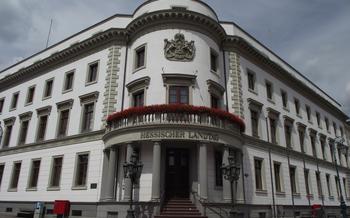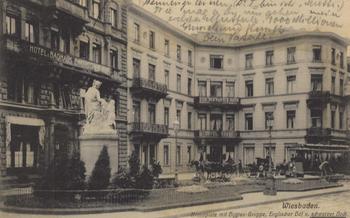
The Hessian State Archive
- A Journey Through History
- Unveiling the Treasures
- Research and Scholarship
- Exhibitions and Events
- Digital Initiatives:
- Research Opportunities:
- Educational Programs
- Behind the Scenes
- Collaboration and Partnerships
- Genealogical Research
- Community Outreach
- Volunteer Opportunities
- Accessibility and Inclusivity
- Insider Tip: Unveiling Hidden Treasures
A Journey Through History
The Hessian State Archive, nestled in the heart of Wiesbaden, Germany, stands as a testament to the rich history and cultural heritage of the region. Established in 1946, the archive has become a treasure trove of invaluable documents, manuscripts, and artifacts that chronicle the captivating story of Hesse. With its vast collection spanning centuries, the archive serves as a gateway to the past, inviting visitors to embark on a journey through time.
The Hessian State Archive plays a pivotal role in preserving the collective memory of Hesse. Through its meticulous efforts to collect, preserve, and catalog historical records, the archive ensures that the legacy of the region is not forgotten. By safeguarding these invaluable documents, the archive contributes to the understanding and appreciation of Hessian history and culture, fostering a sense of identity and belonging among its citizens.
Unveiling the Treasures
The Hessian State Archive houses a treasure trove of unique and rare documents that shed light on the rich history and culture of Hesse and the surrounding regions. Among the highlights of the collection are medieval manuscripts, royal charters, maps, photographs, and personal papers of prominent individuals. Visitors can explore the diverse sections of the archive, each dedicated to a specific topic or era, and discover fascinating stories from the past.
One of the most intriguing documents is the "Codex Eberbachensis," a beautifully illuminated manuscript from the 12th century that contains the Gospels and other religious texts. Another highlight is the "Landbuch of Hesse," a detailed land register from the 16th century that provides insights into the economic and social conditions of the region during that time.
The archive also houses a significant collection of photographs, including images of historical events, everyday life, and architectural landmarks. These photographs offer a glimpse into the past and help visitors visualize the history they are studying.
Acquiring, preserving, and cataloging these documents is a complex and ongoing process. The archive's team of experts works diligently to ensure that the collection is properly maintained and accessible to researchers and the public.
Research and Scholarship
The Hessian State Archive is a renowned research center, attracting scholars and historians from around the world. Its vast collection provides a treasure trove of primary sources for historical research and academic studies. The archive's reading rooms offer a conducive environment for researchers, with access to a wealth of resources including books, manuscripts, maps, and photographs. Online catalogs and digital databases facilitate efficient searching and retrieval of documents, enabling researchers to quickly locate relevant materials. The archive also organizes conferences, workshops, and seminars, providing a platform for scholars to share their research findings and engage in intellectual discussions. The archive's collection has been instrumental in groundbreaking research, leading to the publication of books, articles, and dissertations that have significantly contributed to our understanding of Hessian history and culture.
One notable example is the research conducted by Dr. Anna Schmidt, a historian specializing in the social history of 19th-century Germany. Using the archive's collection of letters, diaries, and administrative records, Dr. Schmidt was able to reconstruct the lives of ordinary people living in Wiesbaden during that period. Her research shed light on their daily struggles, aspirations, and experiences, providing a vivid portrait of society in a time of rapid change. Dr. Schmidt's work has been widely acclaimed by scholars and has been featured in several academic journals and books.
The Hessian State Archive is committed to supporting researchers in their endeavors. It offers a variety of resources and services to facilitate research, including research grants, fellowships, and access to specialized collections. The archive's staff is also available to provide guidance and assistance to researchers, helping them navigate the collection and identify relevant materials.
Exhibitions and Events
The Hessian State Archive regularly organizes exhibitions to showcase its diverse collection to the public. These exhibitions cover a wide range of topics, from historical documents and photographs to artifacts and interactive displays. Visitors can explore the rich history of Hesse and gain insights into various aspects of its culture, politics, and society.
Past exhibitions have featured themes such as "Women in Hessian History," "The Industrial Revolution in Hesse," and "The Hessian State Archive: 100 Years of Preserving History." These exhibitions have showcased rare and unique documents, such as medieval manuscripts, royal decrees, and personal letters, providing visitors with a glimpse into the lives of ordinary people and the events that shaped the history of Hesse.
In addition to exhibitions, the archive also hosts educational programs and workshops for students, teachers, and the general public. These programs cover topics such as archival science, document analysis, and historical research, and provide participants with hands-on experience working with historical documents.
One memorable event held at the archive was a workshop on paleography, the study of ancient handwriting. Participants had the opportunity to examine and transcribe medieval manuscripts, learning about the different writing styles and scripts used in the past. It was a fascinating experience that allowed participants to connect with the past in a very tangible way.
The Hessian State Archive's exhibitions and events offer visitors a unique opportunity to learn about the history of Hesse and explore its rich cultural heritage. Whether you are a history buff, a researcher, or simply someone who is curious about the past, the archive has something to offer everyone.
Digital Initiatives:
The Hessian State Archive embraces the digital age by actively digitizing its vast collection, making it accessible to a global audience. This revolutionary initiative offers numerous advantages for researchers, students, and the general public.
Digitalization breaks down geographical barriers, allowing individuals from around the world to access the archive's treasures without the need for physical travel. Researchers can delve into historical documents from the comfort of their own homes or offices, saving valuable time and resources. Students can explore primary sources for their studies without the constraints of distance or accessibility.
The archive's digital platform provides user-friendly interfaces and search engines, enabling visitors to navigate the collection with ease. Documents are meticulously scanned and uploaded, ensuring the preservation of their original content and integrity. This digital repository serves as a valuable backup, safeguarding the collection from potential risks such as fire, theft, or natural disasters.
By embracing digitization, the Hessian State Archive expands its reach, promotes inclusivity, and ensures the preservation and accessibility of its invaluable collection for generations to come.
Research Opportunities:
The Hessian State Archive offers a wealth of opportunities for researchers to conduct in-depth studies using its extensive collection. Whether you are an academic historian, a genealogist, or simply someone with a passion for history, the archive provides a supportive environment for research and discovery.
Researchers have access to a wide range of materials, including historical documents, manuscripts, maps, photographs, and artifacts. The archive's collection spans centuries of Hessian history, from the Middle Ages to the present day, and covers a diverse range of topics, including politics, economics, social life, and culture.
To facilitate research, the archive provides a number of resources and services, including reading rooms, online catalogs, and research assistance. The staff is knowledgeable and helpful, and can provide guidance on finding and using the materials in the collection.
The archive also offers a variety of research grants and fellowships to support scholars and researchers. These grants can help cover the costs of travel, accommodation, and research materials, making it possible for researchers to conduct in-depth studies using the archive's collection.
Numerous researchers have conducted groundbreaking research using the resources of the Hessian State Archive. For example, Dr. Maria Schmidt, a historian from the University of Frankfurt, used the archive's collection to uncover new insights into the role of women in the Hessian Revolution of 184Her research led to the publication of a book that challenged traditional narratives of the revolution and shed new light on the experiences of women during this tumultuous period.
Educational Programs
The Hessian State Archive offers a wide range of educational programs designed to engage and educate visitors of all ages. These programs cover a variety of topics related to history, archival science, and document analysis, providing participants with a deeper understanding of the archive's collection and its significance.
One of the most popular programs is the guided tour, which takes visitors on a journey through the archive's history, collections, and behind-the-scenes operations. Expert guides provide insights into the fascinating stories behind the documents, explaining their historical context and highlighting their importance. These tours are suitable for groups of all sizes and can be tailored to specific interests or educational needs.
For students, the archive offers educational workshops and interactive activities that bring history to life. These workshops explore various historical themes and periods, using primary sources and hands-on activities to engage students in the learning process. Students have the opportunity to examine historical documents, analyze artifacts, and learn about the methods used by historians and archivists to uncover the past.
The archive also organizes public lectures, seminars, and conferences on a variety of historical topics. These events feature renowned scholars, historians, and experts who share their knowledge and insights on specific historical periods, events, or themes. These lectures and seminars provide an excellent opportunity for the public to learn about the latest research and developments in the field of history.
Through its educational programs, the Hessian State Archive plays a vital role in promoting historical awareness and encouraging a deeper understanding of the past. These programs inspire visitors of all ages to explore the rich history of Hesse and to appreciate the importance of preserving and protecting our cultural heritage.
Behind the Scenes
The Hessian State Archive is a treasure trove of historical documents and artifacts, but what goes on behind the scenes to keep this vast collection organized, preserved, and accessible to researchers? To answer this question, let's take a peek into the daily operations of the archive.
The archive is divided into several departments, each with its own specific responsibilities. The acquisition department is responsible for identifying and acquiring new documents and artifacts to add to the collection. The cataloging department organizes and describes the collection, making it easier for researchers to find the materials they need. The preservation department ensures that the documents and artifacts are properly stored and maintained to prevent damage or deterioration.
Working in an archive can be both challenging and rewarding. Archivists must have a deep understanding of history and archival science, as well as excellent organizational and research skills. They must also be able to work independently and as part of a team. However, the opportunity to handle and study historical documents firsthand makes it a truly unique and rewarding profession.
One of the most fascinating aspects of working in the archive is the chance to discover hidden treasures. Archivists often come across documents or artifacts that have been forgotten or overlooked for years. These discoveries can lead to new insights into historical events or shed light on the lives of ordinary people from the past.
For example, a few years ago, an archivist at the Hessian State Archive discovered a letter written by a young woman who had been forced to leave her home during World War II. The letter was filled with her hopes and fears for the future, and it provided a glimpse into the personal experiences of ordinary people during a tumultuous time in history.
Discoveries like these are a reminder of the importance of archives and the role they play in preserving our collective memory. By carefully preserving and cataloging historical documents, the Hessian State Archive ensures that future generations will have access to the rich and diverse history of Hesse.
Collaboration and Partnerships
The Hessian State Archive actively collaborates with other institutions to enhance its services, reach a broader audience, and promote cultural exchange. These partnerships include universities, libraries, museums, and historical societies.
One of the key benefits of these collaborations is the sharing of resources. The archive gains access to specialized expertise, collections, and research facilities, while its partners benefit from the archive's vast collection of historical documents and artifacts.
Joint projects are another important aspect of these partnerships. The archive has collaborated with universities on research projects, leading to groundbreaking discoveries and publications. Collaborative exhibitions with museums have allowed the archive to showcase its collection to a wider audience and explore new themes and perspectives.
Collaboration also extends to outreach initiatives. The archive works with local schools and community organizations to offer educational programs, workshops, and events. These initiatives promote public awareness of the archive's collection and foster a sense of cultural identity and heritage within the community.
Through these collaborations, the Hessian State Archive strengthens its position as a leading center for historical research and cultural preservation, while contributing to the broader cultural landscape of the region.
Genealogical Research
The Hessian State Archive serves as a treasure trove for those seeking to trace their family history and uncover their genealogical roots. Its vast collection includes a wealth of family records, vital statistics, and immigration documents that provide invaluable insights into the lives of past generations. Whether you're a seasoned genealogist or just starting your journey, the archive offers a wealth of resources to assist you in your quest.
Experienced genealogists will appreciate the archive's extensive collection of family trees, marriage records, birth and death certificates, and census data. These documents provide a solid foundation for tracing family lineages and uncovering ancestral connections. The archive also houses a collection of immigration records, including passenger lists and naturalization papers, which can be particularly useful for tracing the journeys of ancestors who arrived in Germany from other countries.
For those new to genealogical research, the archive offers a range of resources to help you get started. The friendly and knowledgeable staff is always ready to assist visitors with their research, providing guidance on how to navigate the archive's collections and access the most relevant documents. Additionally, the archive offers a variety of workshops and classes on genealogical research, designed to equip researchers with the skills and knowledge they need to successfully trace their family history.
The Hessian State Archive is committed to preserving and making accessible the genealogical records that document the lives of past generations. Whether you're seeking to confirm a family legend, trace your ancestry back to a particular region, or simply learn more about your family's history, the archive provides a rich and rewarding resource for your genealogical research.
Community Outreach
The Hessian State Archive actively engages with the local community to promote public awareness of its collection and foster a sense of cultural identity and heritage. Through various outreach initiatives, the archive strives to make its resources accessible and relevant to a diverse audience.
Public lectures, workshops, and community events are organized regularly to educate and inform the public about the archive's holdings and their significance. These events often feature guest speakers, historical reenactments, and interactive activities, providing a dynamic and engaging learning experience for attendees.
The archive also collaborates with local schools and educational institutions to develop educational programs and workshops tailored to students of all ages. These programs aim to instill an appreciation for history and archival research, while teaching students how to use primary sources to explore the past.
By engaging with the community and promoting public awareness, the Hessian State Archive plays a vital role in preserving and celebrating the cultural heritage of the region. It fosters a sense of connection between the past and the present, ensuring that the stories and experiences of previous generations are not forgotten.
Volunteer Opportunities
The Hessian State Archive offers a range of volunteer opportunities for individuals passionate about history, archival science, and community engagement. By volunteering, you can contribute to the preservation and promotion of Hessian history and culture while gaining valuable experience and knowledge.
Volunteer roles at the archive are diverse, offering something for everyone. You can assist with research projects, helping researchers locate and analyze historical documents. You can contribute to the organization of exhibitions, showcasing the archive's treasures to the public. You can also assist with visitor services, providing guidance and information to visitors from all walks of life.
Volunteering at the Hessian State Archive is a rewarding experience that allows you to make a tangible difference in preserving and sharing the rich history of Hesse. You will gain valuable insights into the workings of an archive, learn about historical research methods, and contribute to the cultural heritage of the region.
To become a volunteer at the archive, you can contact the volunteer coordinator or visit the archive's website for more information. The archive welcomes volunteers from all backgrounds and experience levels, providing training and support to ensure a fulfilling and enriching experience.
Whether you are a student looking to gain practical experience, a retiree seeking a meaningful way to stay engaged, or simply someone with a passion for history, volunteering at the Hessian State Archive is an opportunity to make a lasting contribution to the preservation of our shared heritage.
Accessibility and Inclusivity
The Hessian State Archive is committed to making its collection and services accessible to all visitors, regardless of their abilities, backgrounds, or circumstances. The archive features a range of measures to ensure physical accessibility, including ramps, elevators, and accessible restrooms, making it easy for visitors with disabilities to navigate the building.
To cater to non-native speakers and visitors from diverse backgrounds, the archive offers multilingual resources, such as translated guides, brochures, and online content in multiple languages. Additionally, the staff is trained to assist visitors in their preferred language whenever possible.
The archive also recognizes the importance of assistive technologies for visitors with disabilities. It provides specialized equipment such as magnifiers, screen readers, and hearing aids upon request. Furthermore, the archive's website is designed to be accessible to users with visual impairments, featuring screen-reading capabilities and alternative text descriptions for images.
Through these initiatives and its commitment to inclusivity, the Hessian State Archive strives to create a welcoming and accessible environment for all visitors, ensuring that everyone has the opportunity to explore and learn from its rich collection.
Insider Tip: Unveiling Hidden Treasures
As you delve into the depths of the Hessian State Archive, keep an eye out for a hidden gem known as the "Secret Room." This unassuming door, tucked away in a secluded corner of the archive, leads to a treasure trove of rare and unique documents that are not accessible to the general public. With special permission, however, you can arrange a visit to this hidden chamber and discover its fascinating contents. Among the treasures you might find are ancient manuscripts, medieval maps, and personal letters from historical figures. The Secret Room offers a glimpse into the rich history of Hesse and provides a truly unforgettable experience for visitors who are passionate about history and exploration.









